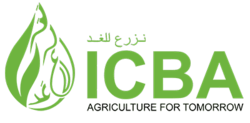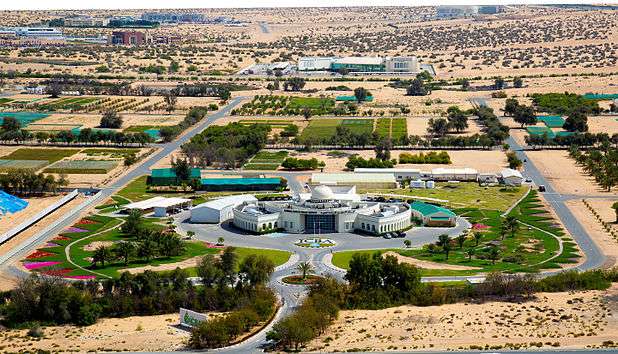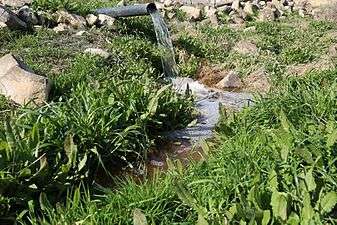International Center for Biosaline Agriculture
 | |
| Abbreviation | ICBA |
|---|---|
| Motto | Agriculture for tomorrow |
| Founded | 1999 |
| Type | International, non-profit |
| Headquarters | Dubai, United Arab Emirates |
Region served | Central Asia and the Caucasus, the Middle East and North Africa, South and South East Asia, sub-Saharan Africa and the Gulf Cooperation Council |
Director General | Ismahane Elouafi |
Chair of Board of Directors | Abdulrahman Sultan Alsharhan |
| Website | http://www.biosaline.org/ |
ICBA (International Center for Biosaline Agriculture) is an international, non-profit agricultural research and development center which focuses on the closely linked issues of water, environment, income, and food security. ICBA conducts research and development programs that aim to improve agricultural productivity and sustainability in marginal environments.
Its headquarters are in Dubai, United Arab Emirates and it is a founding member of the Association of International Research and Development Centers for Agriculture (AIRCA).[1] It is also a member of Middle East and North Africa Network of Water Centers of Excellence[2] and the Asia-Pacific Association of Agricultural Research Institutions (APAARI).[3]
History
In 1992, the Islamic Development Bank (IDB) initiated a series of expert consultations which outlined the objectives and activities of the new institute. In November 1992, the IDB Board of Executive Directors approved financing for start-up operations. Subsequent consultations between the Bank and the General Secretariat of the Gulf Cooperation Council led to the selection of the United Arab Emirates as a host country for the new center.
In 1996, the IDB and the Government of the UAE signed an agreement to establish ICBA as a formal entity. In 1997, the Municipality of Dubai donated 100 hectares of land at Al Ruwayyah, where ICBA's head office is now based. The center became operational in 1999.[4]
Funding

ICBA’s founding donors were the Islamic Development Bank (IDB), the OPEC Fund for International Development (OFID), the Arab Fund for Economic and Social Development (AFESD), and the Government of the United Arab Emirates (UAE).
Currently the Center is funded by the three core donors: the Ministry of Climate Change and Environment of the UAE (formerly the Ministry of Environment and Water); the Environment Agency - Abu Dhabi; and the Islamic Development Bank. The Center has additional support from several development agencies and international donors such as the International Fund for Agricultural Development (IFAD), the International Atomic Energy Agency (IAEA), the UAE Government, Dubai and Abu Dhabi Municipalities, and the private sector in Oman and Saudi Arabia.[5][6]
Research and development focus
Initially ICBA focused solely on biosaline environments but its applied research for development now aims to address agricultural challenges in all marginal environments.[6] Its tasks include assessment of natural resources, climate change adaptation, crop productivity and diversification, aquaculture, bioenergy and policy analysis.
ICBA works on a number of technological developments, including the use of conventional and non-conventional water (such as saline, treated wastewater, industrial water, agricultural drainage, and seawater);[7][8] water and land management technologies; and remote sensing and modeling for climate change adaptation.[2]
The Center conducts research on a variety of food crops which hold promise of being resilient, salt tolerant and water efficient. For example, ICBA has been conducting widespread research on quinoa, a multi-purpose, high-protein grain crop which is drought and salt tolerant. ICBA initiated research on a number of quinoa germplasm accessions since 2006–07. The selections from these trials are being introduced to farmers in in several countries, e.g. in the United Arab Emirates in Abu Dhabi.[9][10]
ICBA scientists are also working to increase the salinity tolerance of hardier traditional crops such as date palms, sorghum and millet.[11]
Another field of research lies with Salicornia and other halophytes (salt-loving plants) that remove salts from saline soils and water.[8] Salicornia’s oil-bearing seeds produce biofuel, cosmetic oil and edible vegetable oil. Its straws can also be used as animal fodder, and its vegetable tips can be harvested for human consumption.[12]
 Using treated wastewater for agriculture in Jordan - part of ICBA’s regional program
Using treated wastewater for agriculture in Jordan - part of ICBA’s regional program- Salicornia research plots at International Center for Biosaline Agriculture
 Salt-tolerant Salicornia shows promise for bioenergy.
Salt-tolerant Salicornia shows promise for bioenergy. ICBA has been evaluating quinoa for use in dry and saline environments.
ICBA has been evaluating quinoa for use in dry and saline environments.
Reach
The geographic scope of ICBA has grown since its inception. It now focusses its work on water-scarce countries of the Middle East and North Africa (MENA) including Gulf Cooperation Council countries (GCC), Central Asia and the Caucasus (CAC) and South and Southwest Asia. It is currently expanding to include countries of sub-Saharan Africa (SSA).[13]
See also
References
- ↑ "AIRCA Members". www.airca.org. Retrieved 2016-04-02.
- 1 2 "International Center for Biosaline Agriculture (ICBA)". Middle East and North Africa Network of Water Centers of Excellence. Retrieved 2016-04-02.
- ↑ "Members : APAARI". Asia Pacific Association of Agricultural Research Institutions. Retrieved 2016-04-17.
- ↑ Shahid, Shabbir A.; Ahmed, Mushtaque (2014). Environmental Cost and Face of Agriculture in the Gulf Cooperation Council Countries. Springer International Publishing. ISBN 978-3-319-05768-2.
- ↑ Al-Attar, Mohammad (2003). Scanes, Colin G.; Miranowski, John A., eds. The Role of Biosaline Agriculture in Managing Freshwater Shortages and Improving Water Security. Iowa State Press. pp. 271–280. doi:10.1002/9780470290187.ch16. ISBN 9780470290187.
- 1 2 Inayatullah, Sohail; Elouafi, Ismahane A. (2014). "The alternative futures of the International Centre for Biosaline Agriculture: from salinity research to greening the desert". Foresight. 16 (5): 389–409. doi:10.1108/FS-08-2013-0030. ISSN 1463-6689.
- ↑ Ponce de Leon, Janice (29 March 2015). "Scientists finding ways to help farmers maximise ground water". Thomson Reuters ZAWYA. Retrieved 2016-04-04.
- 1 2 "ICBA – An Oasis in the Desert". Muslim Science. 2 August 2014. Retrieved 2016-04-07.
- ↑ Wale, Michael (29 July 2015). "UK farming addresses global meat demand". Raconteur. Retrieved 2016-04-04.
- ↑ Banerjee, Thirtho (19 July 2015). "Proper value chain needed for Quinoa" (PDF). The Gulf Time.
- ↑ Cadei, Emily (15 April 2014). "Saltwater Saviours". OZY. Retrieved 2016-04-04.
- ↑ Hashem, Heba (25 March 2015). "Why research won't give up on Salicornia". MIT Technology Review. Retrieved 2016-04-04.
- ↑ Shahid, Shabbir A.; Taha, Faisal K.; Ismail, Shoaib; Dakheel, Abdullah; Abdelfattah, Mahmoud (2011). Behnassi, Mohamed; Shahid, Shabbir A.; D'Silva, Joyce, eds. Turning Adversity into an Advantage for Food Security Through Improving Soil Quality and Providing Production Systems for Marginal Saline Lands: ICBA Perspectives and Approach. Springer Netherlands. pp. 43–67. doi:10.1007/978-94-007-0519-7_3. ISBN 9789400705180.
External links
- Official website
- International Center for Biosaline Agriculture on Facebook
- International Center for Biosaline Agriculture on Twitter